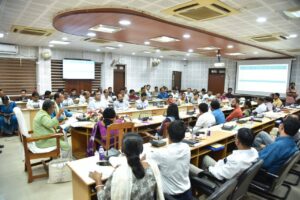Tripura Minister Ratan Lal Nath has called for stronger coordination between public representatives and government departments to accelerate development in West Tripura. Speaking at the Zilla Parishad’s quarterly review meeting, he urged collaborative action to improve sectors like infrastructure, agriculture, welfare, and industry for inclusive state growth.
West Tripura took another step toward accelerated development on Friday as the General Body Meeting of the West Tripura Zilla Parishad brought together top political leaders, administrative officials, and grassroots representatives to discuss progress and remove hurdles in ongoing projects. The meeting, held at the District Magistrate’s office, served as a platform to review development strategies and set the tone for coordinated action across the district.
The meeting was presided over by Tripura’s Power, Agriculture and Farmers’ Welfare Minister Ratan Lal Nath, and was attended by MLAs Mina Rani Sarkar and Sapna Debbarma, West Tripura District Magistrate Dr. Vishal Kumar, Zilla Parishad members, Panchayat Samiti Chairpersons, Block Officers from multiple blocks, and senior officials from various line departments.
Quarterly Review for Targeted Progress
Minister Nath informed the gathering that such meetings are held every three months to systematically assess departmental work, identify bottlenecks, and ensure the timely execution of projects. This consistent review mechanism, he said, is critical for maintaining momentum and avoiding unnecessary delays in developmental initiatives.
“The representatives of the three-tier panchayats and government officials must work hand in hand for the welfare of the people,” Nath stated, underlining the necessity of a collaborative approach. “Only when public representatives stay connected with citizens can the state move ahead rapidly.”
Strengthening the Backbone of Development
Highlighting the complementary roles of elected representatives and government employees, Nath described them as the “backbone” of Tripura’s development machinery. He stressed that their joint participation is essential to bring about tangible improvements in key sectors such as:
Drinking water supply
Education infrastructure and quality
Housing schemes
Road connectivity
Electricity coverage and reliability
Agricultural productivity and irrigation
Social welfare initiatives
Industrial growth and employment generation
By strengthening coordination between political leadership and departmental staff, the state can not only address public needs faster but also ensure that resources are optimally utilized.

Grassroots Communication is Key
Nath urged all panchayat representatives to maintain regular and open communication with relevant departments about the issues faced by their constituencies. He emphasized that effective governance is rooted in understanding citizens’ concerns directly from the ground level and responding with practical, timely solutions.
“The faster we can identify a problem and communicate it to the right department, the sooner we can bring relief to the people,” he said.
A Call for Collective Responsibility
The meeting also reiterated the importance of inclusivity in decision-making. Officials from various line departments presented updates on projects under their purview, with discussions focusing on removing roadblocks and ensuring smoother inter-departmental cooperation.
By fostering a culture of accountability and teamwork, stakeholders believe that Tripura can achieve a more balanced and equitable development model, one that benefits both rural and urban populations alike.
| Also Read: 90,000 Yaba Tablets recovered from auto-rickshaw in West Tripura |
Minister Nath concluded the session by calling on every public representative and government employee present to view themselves as custodians of public trust. He said that development is not the responsibility of a single department or leader, but a shared mission that demands commitment from all levels of governance.
The West Tripura Zilla Parishad’s quarterly review has set a proactive example for other districts, showcasing how regular dialogue between elected representatives and administrative machinery can become a powerful engine for progress.












